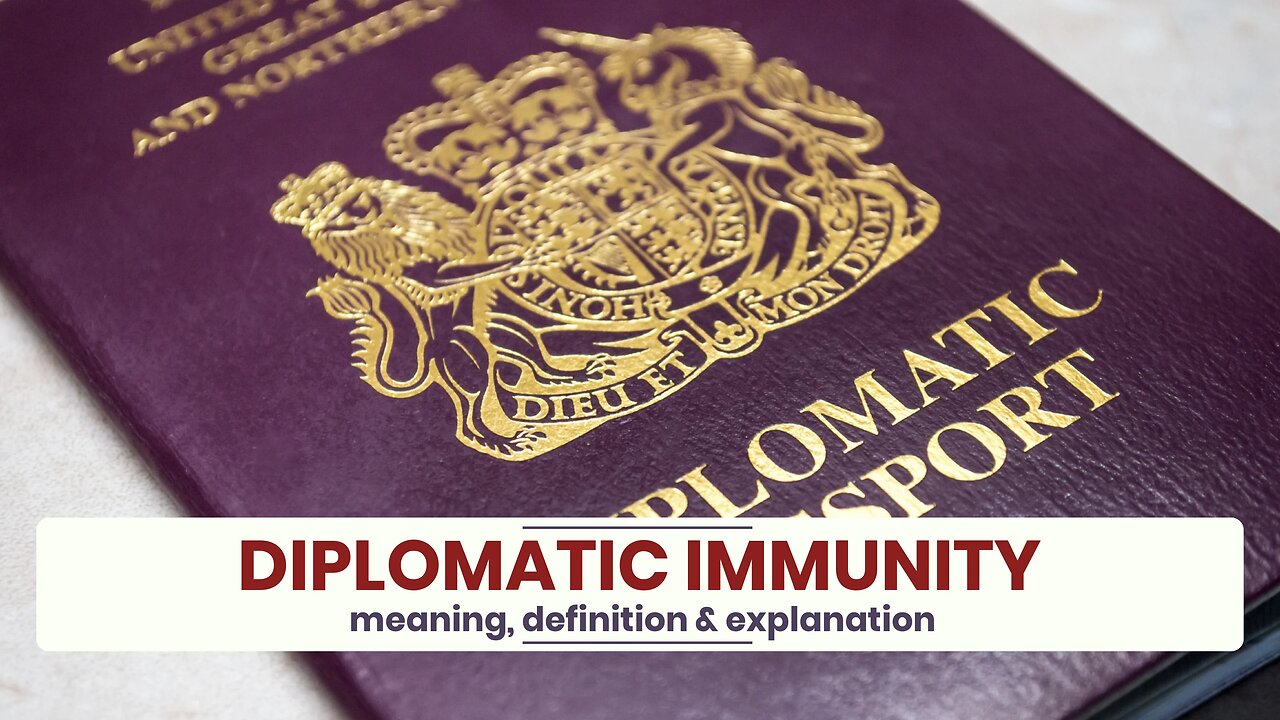Premium Only Content

What is DIPLOMATIC IMMUNITY?
✪✪✪✪✪
http://www.theaudiopedia.com
✪✪✪✪✪
What does DIPLOMATIC IMMUNITY mean? DIPLOMATIC IMMUNITY meaning - DIPLOMATIC IMMUNITY definition - DIPLOMATIC IMMUNITY explanation. What is the meaning of DIPLOMATIC IMMUNITY? What is the definition of DIPLOMATIC IMMUNITY? What does DIPLOMATIC IMMUNITY stand for? What is DIPLOMATIC IMMUNITY meaning? What is DIPLOMATIC IMMUNITY definition?
Diplomatic immunity is a form of legal immunity that ensures diplomats are given safe passage and are considered not susceptible to lawsuit or prosecution under the host country's laws, although they can still be expelled. Modern diplomatic immunity was codified as international law in the Vienna Convention on Diplomatic Relations (1961) which has been ratified by all but a handful of nations, though the concept and custom of such immunity have a much longer history dating back thousands of years. Many principles of diplomatic immunity are now considered to be customary law. Diplomatic immunity as an institution developed to allow for the maintenance of government relations, including during periods of difficulties and armed conflict. When receiving diplomats, who formally represent the sovereign, the receiving head of state grants certain privileges and immunities to ensure they may effectively carry out their duties, on the understanding that these are provided on a reciprocal basis.
Originally, these privileges and immunities were granted on a bilateral, ad hoc basis, which led to misunderstandings and conflict, pressure on weaker states, and an inability for other states to judge which party was at fault. An international agreement known as the Vienna Conventions codified the rules and agreements, providing standards and privileges to all states.
It is possible for the official's home country to waive immunity; this tends to happen only when the individual has committed a serious crime, unconnected with their diplomatic role (as opposed to, say, allegations of spying), or has witnessed such a crime. However, many countries refuse to waive immunity as a matter of course; individuals have no authority to waive their own immunity (except perhaps in cases of defection). Alternatively, the home country may prosecute the individual. If immunity is waived by a government so that a diplomat (or their family members) can be prosecuted, it must be because there is a case to answer and it is in the public interest to prosecute them. For instance, in 2002, a Colombian diplomat in London was prosecuted for manslaughter, once diplomatic immunity was waived by the Colombian government.
-
 2:24
2:24
The Audiopedia
1 year agoWhat is AUSTERITY?
83 -
 44:41
44:41
Inverted World Live
8 hours agoPolitical Violence in Minnesota w/ AK Kamara
61K9 -
 LIVE
LIVE
SpartakusLIVE
8 hours ago#1 Massive MEAT-HEAD can't stop WINNING, can't stop FLEXING
1,613 watching -
 LIVE
LIVE
Drew Hernandez
9 hours agoGIDEON AI THREAT DETECTION SOFTWARE PUSH & NEW EPSTEIN EMAIL LEAK?
1,672 watching -
 2:03:51
2:03:51
TimcastIRL
5 hours agoTrans Minneapolis Shooter BLAMED Massacre On Mom & Gender Transition | Timcast IRL
161K227 -
 47:29
47:29
Man in America
11 hours agoIT DOESN'T ADD UP: The Trans Shooter's Story Is FULL of Holes
29.5K32 -
 3:59:36
3:59:36
StevieTLIVE
4 hours agoFriday Night Warzone HYPE
28.5K1 -

SynthTrax & DJ Cheezus Livestreams
1 day agoFriday Night Synthwave 80s 90s Electronica and more DJ MIX Livestream Michael Jackson / AI Art Compilation Edition
32.8K -
 1:03:57
1:03:57
Sarah Westall
4 hours agoMara Lago Accord Joins the Fed, Fed Waves the White Flag & more w/ Andy Schectman
17.2K -
 2:44:12
2:44:12
I_Came_With_Fire_Podcast
1 day ago*BREAKING* Special Guest Katarina Szulc
24.5K1